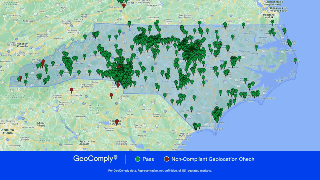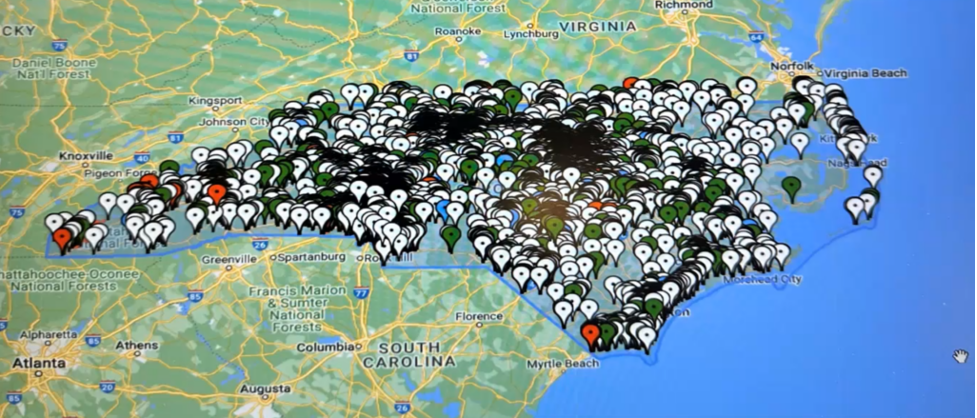
The untold truth about sports betting is that the state tax revenue that it is intended to generate comes at a very high cost for North Carolinians statewide. Early numbers are in, and this truth is already undeniably evident.
On June 14, 2023, with Governor Cooper’s signature, HB 347—Sports Wagering/Horse Race Wageringbecame law, and sports betting was approved in North Carolina, making gambling available in North Carolina on every smartphone, tablet, and computer. Then, in January, the State Lottery Commission voted to approve a launch date for sports betting to begin March 11, just before the start of the ACC Men’s Basketball Tournament and NCAA March Madness the following week.
Pro-gambling advocates, and much of the news media presented the launch of sports betting in North Carolina as exciting, positive news: “NC Sports Betting Rakes In $200 Mil. In First Week” or “North Carolina Sees Millions During First Week of Online Sports Betting” or, on day one before we had any numbers, “Place your bets! Sports betting is up and running in North Carolina.”
The State Lottery Commission reports that $23.9 million was wagered in just the first 12 hours. With around $12.2 million paid out to winners, this resulted in a statewide gross sports wagering revenue of just over $11 million on the first day and estimated state tax revenue of almost $2 million.
In total, for the first week, the Lottery Commission reports $198.1 million in total wagers with $42.7 million in gross wagering revenue. Since the state taxes such revenue at 18%, that means anticipated state tax revenue around $7.6 million. Sterl Carpenter, who leads the Gaming Compliance and Sports Betting Division of the Lottery Commission, anticipates more than $594 million in wagers in the first month.
GeoComply, a leader in location detection services that allows vendors like sportsbook platforms to verify user locations for betting legality, views all of this as an indication that North Carolina is “poised to be a leading sports betting market in the United States.” But is that a good thing?
Governor Roy Cooper says, “The legalization of sports betting will provide a significant boost to North Carolina’s economy and will allow our thriving sports industry to continue to grow,” but here is the economic reality for North Carolinians.
A key concept when it comes to sports betting, is gross wager revenue (GWR) – also known as gross gaming revenue—which measures the difference between the total value of the bets and the amount of winnings paid out. Essentially, this could just as easily be called, “net gambling losses.” The gambling industry’s incentive is to maximize revenue, so the higher the losses, the higher their “revenue.”
Even when we consider so-called tax revenue, we see a grim picture. North Carolina taxes GWR at 18%. In order for the state to generate $1 million in tax revenue, the GWR would have to be more than $5.5 million. So, in order for North Carolina to “make” $1 million in tax revenue, North Carolinians have to lose $5.5 million. The remaining $4.5 million goes into the pockets of the sportsbook operators.
Will there be individuals who come out ahead in sports betting? That is certainly possible. But it is clear that, as a state, our citizens are losing big. The numbers from the first week make it clear. North Carolinians gambled almost $200 million, losing more than $42 million, and the state generated less than $8 million in tax revenue.
While the calculations above reveal the inherent economic harm of sports betting, the risks leading to problem gambling add an even darker, more human concern. And the higher the utilization, the more families and individuals will be harmed by it. One meta-analysis estimates that one in ten college students has pathological gambling issues. Even the Lottery Commission “knows sports betting can open the door to gambling addiction for some.”
Unfortunately, it is clear from the first week that sports betting is already widespread in North Carolina. GeoComply reported that North Carolina experienced more than 5 million geolocation checks for sports betting activity and almost 370,000 new accounts within the first 48 hours of its legal online sports betting launch. In comparison, there were a little over 2 million geolocation checks in Virginia for the same period.
Imagery from GeoComply shows the prevalence of geolocation checks during March Madness in North Carolina.

GeoComply: PinDrop during the NCAA tournament
This image shows the prevalence of sports betting in North Carolina in just the first hour.

2 GeoComply: Each pin represents someone placing a bet in the first hour that sports gambling went live in North Carolina on March 11, 2024.
This ubiquity of participation will bring with it stories of loss and suffering.
As mentioned above, the Lottery Commission estimates that North Carolina will likely see $594 million in online sports bets during the first month. Tyler Andrews, editor of NC Sharp, estimates that “North Carolina could generate up to $7 billion in total bets in its first full year of online sports betting”—putting North Carolina in the top five or ten states in the country for sports betting.
If these estimates are right, in the months ahead, North Carolinians stand to lose massive amounts of money to the gambling industry and incur untold social and economic costs in the form of individuals and families being victimized by gambling and gambling addiction.